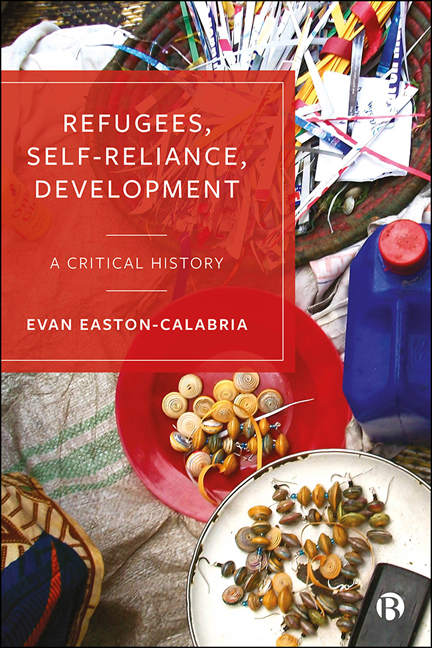Book contents
- Frontmatter
- Dedication
- Contents
- List of Figures and Tables
- Abbreviations and Acronyms
- Notes on the Author
- Acknowledgements
- 1 Introduction: Why Refugee Self-Reliance?
- 2 Self-Sufficiency out of Necessity: Refugee Self-Reliance Assistance in Interwar Greece
- 3 Socialism and Self-Reliance: Refugee Self-Reliance Assistance in Post-Colonial East Africa
- 4 Warriors of Self-Reliance: Refugee Self-Reliance Assistance in Cold War Pakistan
- 5 Dignity in Informality? Urban Refugee Self-Reliance Assistance in Kampala, Uganda
- 6 Livelihoods 2.0? Refugee Self-Reliance and the Digital Gig Economy
- 7 Conclusion
- Annex: A Note on Methods and Sources
- References
- Index
3 - Socialism and Self-Reliance: Refugee Self-Reliance Assistance in Post-Colonial East Africa
Published online by Cambridge University Press: 12 October 2022
- Frontmatter
- Dedication
- Contents
- List of Figures and Tables
- Abbreviations and Acronyms
- Notes on the Author
- Acknowledgements
- 1 Introduction: Why Refugee Self-Reliance?
- 2 Self-Sufficiency out of Necessity: Refugee Self-Reliance Assistance in Interwar Greece
- 3 Socialism and Self-Reliance: Refugee Self-Reliance Assistance in Post-Colonial East Africa
- 4 Warriors of Self-Reliance: Refugee Self-Reliance Assistance in Cold War Pakistan
- 5 Dignity in Informality? Urban Refugee Self-Reliance Assistance in Kampala, Uganda
- 6 Livelihoods 2.0? Refugee Self-Reliance and the Digital Gig Economy
- 7 Conclusion
- Annex: A Note on Methods and Sources
- References
- Index
Summary
Introduction
After the Second World War ended, and throughout the rest of the 1940s and early 1950s, the Allies concentrated efforts on repatriating or resettling the 10 to 12 million displaced persons scattered across Europe. Both the successes and the failures of the League of Nations, which dissolved in 1946, paved the way for the United Nations (UN), an international institution more structured, influential, and broader in scope than the League had ever been. In 1951, UNHCR superseded the International Refugee Organisation and UNRRA, which had originally addressed war-related European displacement. With the Second World War nearly two decades behind them, and the ‘Clear the Camps’ campaign freshly closed, the international refugee regime moved from Europe to Africa. A contemporary of Dr Ruth Parmelee, a man named Tristam Frederick Betts began working in Africa just as the wider international refugee regime did. He spent much of his time both prior to and after decolonization in Tanzania, the focus of this chapter.
Only a certain type of person eschews the title of ‘scholar’ and nods in approval at the description of ‘gadfly’. Yet box upon grey box in Oxford's Refugee Studies Centre archives detail Betts’ work, a man who, friends and colleagues agree, would rather have had the latter title. ‘Despite a somewhat crusty exterior,’ a journal dedication reads, ‘the humanitarianism in his heart was not easily disguised, and motivated all his best work.’ Betts became the Oxfam Field Director for East and Southern Africa in 1962, thereby beginning two decades of work in refugee resettlement. Vociferous, critical, and adamantly honest, Betts wrote scathing reviews of ill-conceived rural development plans, multiple papers for international conferences pertaining to refugees, and reams of refugee settlement reports. Together, the papers comprising the T. F. Betts Collection paint a strikingly thorough picture of refugee assistance in Africa from the 1960s to the 1980s. Pointillism of sorts, the collection reveals the mundane inner workings of settlement administration as well as provides an overarching analysis of trends in refugee assistance (including repeatedly unaddressed problems) that most other relevant archives lack. It is this collection, along with UNHCR and ILO archives, that form the empirical basis of this chapter.
- Type
- Chapter
- Information
- Refugees, Self-reliance, DevelopmentA Critical History, pp. 59 - 93Publisher: Bristol University PressPrint publication year: 2022



